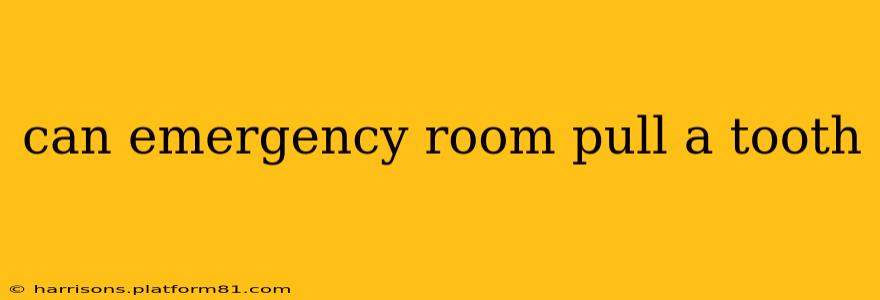Dental emergencies are painful and stressful, leaving many wondering if a quick trip to the ER is the solution for a severely aching or damaged tooth. While emergency rooms are equipped to handle various medical crises, their role in tooth extraction is nuanced. Let's delve into the circumstances under which an ER might pull a tooth and what you should expect.
When Might an ER Extract a Tooth?
The short answer is: rarely. Emergency rooms prioritize life-threatening and critical conditions. Tooth extraction, while painful and potentially problematic, generally isn't considered a life-threatening emergency unless it's directly related to a more serious issue. Situations where an ER might extract a tooth include:
- Severe Trauma: If a tooth is severely damaged due to an accident (e.g., a sports injury or car accident) and needs immediate removal to prevent further complications, the ER might extract it. This would likely involve significant bleeding or risk of infection.
- Infection with Systemic Effects: A severe dental infection (abscess) that has spread to other parts of the body (e.g., causing sepsis) could necessitate emergency intervention. The tooth extraction would be part of a broader treatment plan to address the life-threatening infection.
- Compromised Immune System: Individuals with severely compromised immune systems might face a higher risk of serious complications from a dental infection. In such cases, the ER might intervene to prevent a potentially deadly infection from developing.
It's crucial to understand: Even in these situations, the ER's primary goal is stabilizing the patient. They will likely provide pain relief, control bleeding, and potentially address the immediate threat, but they might not perform a technically perfect extraction. They’re more likely to focus on managing the immediate threat to life or limb.
What Happens if I Go to the ER for a Toothache?
If you go to the ER with a toothache that isn't linked to severe trauma or a life-threatening infection, you will likely receive pain medication and potentially antibiotics. However, they will not perform a routine tooth extraction. They will refer you to a dentist or oral surgeon for appropriate care.
What's the Best Course of Action for a Toothache?
For most dental emergencies, including severe toothaches, chipped teeth, or knocked-out teeth, your best course of action is to contact a dentist or an emergency dental service. These professionals have the specialized tools, expertise, and sterile environment necessary to provide safe and effective treatment.
Delaying dental care can lead to more extensive damage and complications, making it a more costly and painful procedure later on.
Are There Alternatives to Going to the ER?
Yes, absolutely! Here are some better options:
- Your regular dentist: Contact them for an emergency appointment.
- Emergency dental clinic: Many areas have clinics dedicated to emergency dental care.
- Dental hotline: Some regions offer dental hotlines that can provide advice and connect you with appropriate services.
What if I Can't Afford a Dentist?
Dental care can be expensive. If you lack dental insurance or can't afford a visit, explore options such as:
- Dental schools: Dental schools often provide discounted care.
- Community health centers: Many offer dental services on a sliding-fee scale based on income.
- Government assistance programs: Research local and national programs that offer financial assistance for dental care.
In conclusion, while extremely rare, an emergency room might pull a tooth under specific life-threatening circumstances. For most dental issues, seeking help from a dentist or emergency dental service is the best, safest, and most effective approach. Don't hesitate to reach out for professional dental care when experiencing a dental emergency; delaying treatment only exacerbates the problem.
